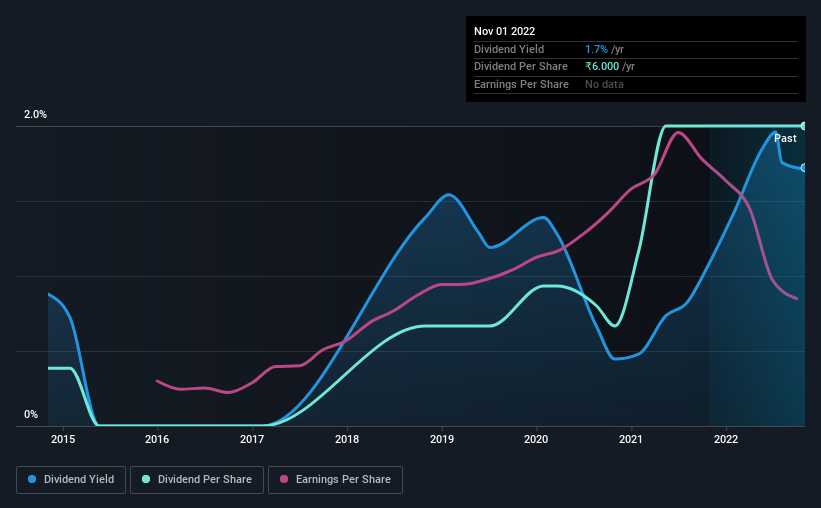Vaibhav Global (NSE:VAIBHAVGBL) Has Affirmed Its Dividend Of ₹1.50
The board of Vaibhav Global Limited (NSE:VAIBHAVGBL) has announced that it will pay a dividend of ₹1.50 per share on the 26th of November. Based on this payment, the dividend yield on the company's stock will be 1.7%, which is an attractive boost to shareholder returns.
Check out the opportunities and risks within the IN Luxury industry.
Vaibhav Global's Dividend Is Well Covered By Earnings
We like to see robust dividend yields, but that doesn't matter if the payment isn't sustainable. Prior to this announcement, Vaibhav Global's dividend was making up a very large proportion of earnings, and the company was also not generating any cash flow to offset this. Generally, we think that this would be a risky long term practice.
Looking forward, earnings per share is forecast to rise by 40.7% over the next year. If the dividend continues along recent trends, we estimate the payout ratio will be 64%, which is in the range that makes us comfortable with the sustainability of the dividend.

Vaibhav Global's Dividend Has Lacked Consistency
Even in its relatively short history, the company has reduced the dividend at least once. If the company cuts once, it definitely isn't argument against the possibility of it cutting in the future. The dividend has gone from an annual total of ₹1.16 in 2014 to the most recent total annual payment of ₹6.00. This implies that the company grew its distributions at a yearly rate of about 23% over that duration. It is great to see strong growth in the dividend payments, but cuts are concerning as it may indicate the payout policy is too ambitious.
The Dividend Looks Likely To Grow
Given that the dividend has been cut in the past, we need to check if earnings are growing and if that might lead to stronger dividends in the future. It's encouraging to see that Vaibhav Global has been growing its earnings per share at 11% a year over the past five years. EPS has been growing at a reasonable rate, although with most of the profits being paid out to shareholders, growth prospects could be more limited in the future.
Our Thoughts On Vaibhav Global's Dividend
Overall, we don't think this company makes a great dividend stock, even though the dividend wasn't cut this year. While Vaibhav Global is earning enough to cover the payments, the cash flows are lacking. We don't think Vaibhav Global is a great stock to add to your portfolio if income is your focus.
Investors generally tend to favour companies with a consistent, stable dividend policy as opposed to those operating an irregular one. Still, investors need to consider a host of other factors, apart from dividend payments, when analysing a company. For example, we've identified 3 warning signs for Vaibhav Global (1 shouldn't be ignored!) that you should be aware of before investing. Looking for more high-yielding dividend ideas? Try our collection of strong dividend payers.
New: Manage All Your Stock Portfolios in One Place
We've created the ultimate portfolio companion for stock investors, and it's free.
• Connect an unlimited number of Portfolios and see your total in one currency
• Be alerted to new Warning Signs or Risks via email or mobile
• Track the Fair Value of your stocks
Have feedback on this article? Concerned about the content? Get in touch with us directly. Alternatively, email editorial-team (at) simplywallst.com.
This article by Simply Wall St is general in nature. We provide commentary based on historical data and analyst forecasts only using an unbiased methodology and our articles are not intended to be financial advice. It does not constitute a recommendation to buy or sell any stock, and does not take account of your objectives, or your financial situation. We aim to bring you long-term focused analysis driven by fundamental data. Note that our analysis may not factor in the latest price-sensitive company announcements or qualitative material. Simply Wall St has no position in any stocks mentioned.
About NSEI:VAIBHAVGBL
Vaibhav Global
Engages in the manufacture and export of fashion jewelry and lifestyle products in India, the United States of America, the United Kingdom, Germany, and internationally.
Flawless balance sheet established dividend payer.
Similar Companies
Market Insights
Community Narratives


Recently Updated Narratives


MINISO's fair value is projected at 26.69 with an anticipated PE ratio shift of 20x


The Quiet Giant That Became AI’s Power Grid


Nova Ljubljanska Banka d.d will expect a 11.2% revenue boost driving future growth
Popular Narratives


The company that turned a verb into a global necessity and basically runs the modern internet, digital ads, smartphones, maps, and AI.


MicroVision will explode future revenue by 380.37% with a vision towards success



